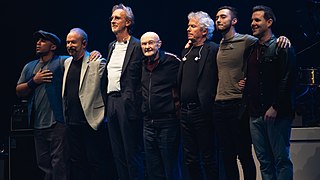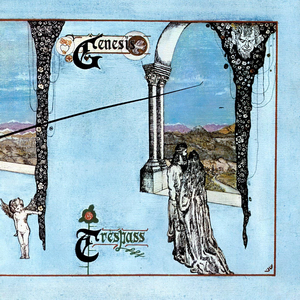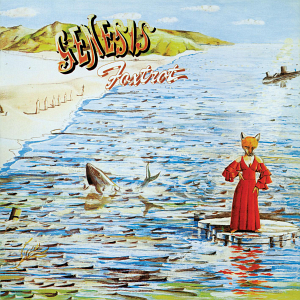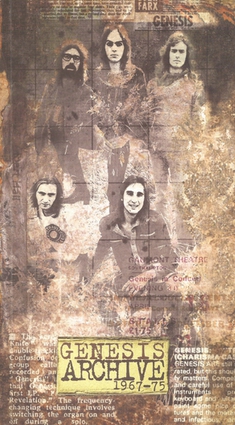
Genesis were an English rock band formed at Charterhouse School, Godalming, Surrey, in 1967. The band's longest-existing and most commercially successful line-up consisted of keyboardist Tony Banks, bassist/guitarist Mike Rutherford and drummer/singer Phil Collins. In the 1970s, during which the band also included singer Peter Gabriel and guitarist Steve Hackett, Genesis were among the pioneers of progressive rock.

The Moody Blues were an English rock band formed in Birmingham in 1964. The band initially consisted of Graeme Edge (drums), Denny Laine (guitar/vocals), Mike Pinder (keyboards/vocals), Ray Thomas (multi-instrumentalist/vocals), and Clint Warwick (bass/vocals). Originally part of the British beat and R&B scene of the early–mid 1960s, the band came to prominence with the UK No. 1 and US Top 10 single "Go Now" in late 1964/early 1965. Laine and Warwick both left the band in 1966, with Edge, Pinder and Thomas recruiting new members Justin Hayward (guitar/vocals) and John Lodge (bass/vocals). They embraced the psychedelic rock movement of the late 1960s, with their second album, 1967's Days of Future Passed, being a fusion of rock with classical music that established the band as pioneers in the development of art rock and progressive rock. It has been described as a "landmark" and "one of the first successful concept albums".

Anthony George Banks is an English musician primarily known as the keyboardist and founding member of the rock band Genesis. Banks is also a prolific solo artist, releasing six solo studio albums that range through progressive rock, pop, and classical music.

Nicholas David Kershaw is an English singer, songwriter, multi-instrumentalist and record producer. He came to prominence in 1984 as a solo artist. He released eight singles that entered the top 40 of the UK Singles Chart during the decade, including "Wouldn't It Be Good", "Dancing Girls", "I Won't Let the Sun Go Down on Me", "Human Racing", "The Riddle", "Wide Boy", "Don Quixote", and "When a Heart Beats". His 62 weeks on the UK Singles Chart through 1984 and 1985 beat all other solo artists. Kershaw appeared at the multi-venue benefit concert Live Aid in 1985 and has also penned a number of hits for other artists, including a UK No. 1 single in 1991 for Chesney Hawkes, "The One and Only".

Stephen Richard Hackett is an English guitarist who gained prominence as the lead guitarist of the progressive rock band Genesis from 1971 to 1977. Hackett contributed to six Genesis studio albums, three live albums, seven singles and one EP before he left to pursue a solo career. He was inducted into the Rock and Roll Hall of Fame as a member of Genesis in 2010.

Trespass is the second studio album by the English rock band Genesis. It was released on 23 October 1970 by Charisma Records, and is their last album with original guitarist Anthony Phillips and their only album with drummer John Mayhew.

Foxtrot is the fourth studio album by the English progressive rock band Genesis, released on 15 September 1972 on Charisma Records. It features their longest recorded song, the 23-minute track "Supper's Ready".

Genesis Live is the first live album from the English rock band Genesis, released on 20 July 1973 on Charisma Records. Initially recorded for radio broadcast on the American rock program King Biscuit Flower Hour, the album is formed from the recordings of shows at Free Trade Hall, Manchester and De Montfort Hall, Leicester in February 1973 during the band's tour supporting their fourth studio album Foxtrot (1972).

Seconds Out is the second live album by English progressive rock band Genesis. It was released as a double album on 14 October 1977 on Charisma Records, and was their first with touring drummer Chester Thompson and their last with guitarist Steve Hackett. The majority was recorded in June 1977 at the Palais des Sports in Paris during the Wind & Wuthering Tour. One track, "The Cinema Show", was recorded in 1976 at the Apollo in Glasgow during their A Trick of the Tail Tour.

Genesis is the twelfth studio album by English rock band Genesis, released on 3 October 1983 by Charisma and Virgin Records in the UK and by Atlantic Records in the US and Canada. Following the band's tour in support of their 1982 live album Three Sides Live, Genesis took an eight-month break before they regrouped in the spring of 1983 to record a new album. It is their first written and recorded in its entirety at their studio named The Farm in Chiddingfold, Surrey, and the songs were developed through jam sessions in the studio with nothing written beforehand. Hugh Padgham returned as their engineer.

Wind & Wuthering is the eighth studio album by English progressive rock band Genesis. It was released on 17 December 1976 on Charisma Records and is their last studio album to feature guitarist Steve Hackett. Following the success of their 1976 tour to support their previous album A Trick of the Tail, the group relocated to Hilvarenbeek in the Netherlands to record a follow-up album, their first recorded outside the UK. Writing and recording caused internal friction, as Hackett felt some of his contributions were dropped in favour of material by keyboardist Tony Banks.

...And Then There Were Three... is the ninth studio album by the English rock band Genesis. It was released on 31 March 1978 by Charisma Records and is their first recorded as a trio of singer/drummer Phil Collins, keyboardist Tony Banks, and bassist/guitarist Mike Rutherford, following the departure of guitarist Steve Hackett. The album marked a shift in the band's sound, mixing elements of their progressive rock roots with more accessible material, and Collins contributing to more of the group's songwriting.
After the Fire were a British rock band that evolved from playing progressive rock to new wave over ten years, while having one hit in the United States and another hit in the United Kingdom.

Genesis Archive 1967–75 is a box set by the English progressive rock band Genesis, released on 22 June 1998 on Virgin Records in the United Kingdom and by Atlantic Records in the United States. After the release of their studio album Calling All Stations in 1997, the band assembled recordings from their history for release which involved the participation of former members Peter Gabriel, Anthony Phillips, Steve Hackett, Phil Collins, John Mayhew, and John Silver. The set includes previously unreleased studio, live, and demo tracks, some of which include re-recorded vocal and guitar parts from Gabriel and Hackett, respectively.
The Real People are an English rock band formed in Liverpool in 1986. The band currently consists of Tony Griffiths, Chris Griffiths, Martin Lappin (guitar), Tony McGuigan (drums), and James Breckon (keyboards).

"In Too Deep" is a song by English rock band Genesis, included as the fourth track on their 13th studio album, Invisible Touch (1986). It was released as the second single from the LP in the UK and the fifth single in the US. The single was a success in America during the summer of 1987; it reached the No. 3 spot on the US Billboard Hot 100 chart, and the No. 1 spot on the Adult Contemporary chart. The song was only performed live during the 1986 North American legs during the Genesis 1986–87 Invisible Touch world tour. An October 1986 performance of the song was included on the 1992 live album The Shorts.

"Follow You Follow Me" is a love song written and recorded by English rock band Genesis. It was released in February 1978 as the first single from their ninth studio album, ...And Then There Were Three... (1978). The music was composed by the band, and the lyrics were written by bassist and guitarist Mike Rutherford. The single became Genesis' first top 10 hit in the UK and first top 40 hit in the US, reaching No. 7 and No. 23 respectively.

"Throwing It All Away" is the seventh track on the 1986 album Invisible Touch by Genesis. It was the second single taken from the album in the United States, reaching No. 4 on the Billboard Hot 100 in October 1986, as well as No. 1 on Billboard's Adult Contemporary chart and the Album Rock Tracks chart. It was the last single released from the album in the UK in June 1987, reaching No. 22. The song was also a top 40 hit on the Irish Singles Chart, peaking at No. 24. The working title was "Zephyr and Zeppo".

The Fugitive is the second solo album by Genesis keyboardist Tony Banks. It was originally released in June 1983, on Charisma (UK), and Atlantic (US). It was produced by Banks himself, and co-produced by the Grammy Award–winning Stephen Short. The album is the only album in which Banks sings all of the lead vocals. On the previous concept album, A Curious Feeling (1979) all of the vocals were done by Kim Beacon. When that album did not turn out too successfully, Banks thought that it was pointless to continue that project. As compared to A Curious Feeling, the songs on The Fugitive were much more commercially accessible and less experimental.

"I Know What I Like (In Your Wardrobe)" was the first charting single by English rock band Genesis. It was drawn from their 1973 album Selling England by the Pound. The single was released in the UK in February 1974, and became a minor hit in April 1974, when it reached number 21 in the UK Singles Chart.


















